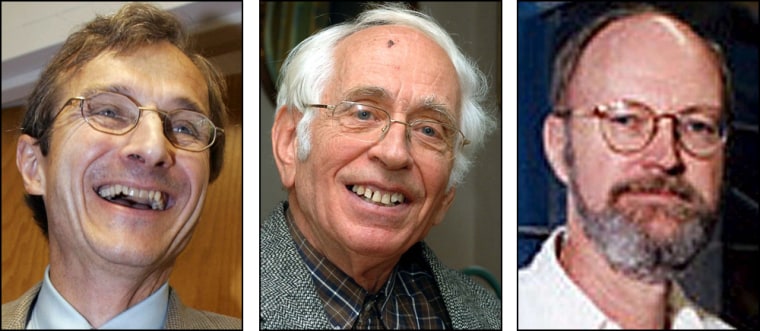Americans Robert H. Grubbs and Richard R. Schrock and Yves Chauvin of France won the Nobel Prize in chemistry Wednesday for discoveries that let industry create drugs and advanced plastics in a more efficient and environmentally friendly way.
The trio won the award for their development of the metathesis method in organic synthesis — a way to swap groups of atoms between molecules that the Royal Swedish Academy of Sciences likened to a dance in which couples change partners.
The process is used daily in the chemical, biotechnology and food industries to make stronger plastics, better drugs and improved food preservatives.
By reducing the number of hazardous byproducts in a chemical reaction, metathesis leads to cleaner and more environmentally friendly production.
“This represents a great step forward for ‘green chemistry,’ reducing potentially hazardous waste through smarter production. Metathesis is an example of how important basic science has been applied for the benefit of man, society and the environment,” the committee said.
Celebrating scientific success
Grubbs, 63, is a professor of chemistry at the California Institute of Technology, and Schrock is a chemistry professor at the Massachusetts Institute of Technology. Chauvin, 74, is the honorary director of research at the Institut Francais du Petrole in Rueil-Malmaison, France.
“I feel pretty shaken — that means I can’t talk very well. I had just gotten up and was having a little coffee. I felt that it couldn’t possibly be true, but it was,” Schrock told Swedish Radio after receiving the news.
Grubbs, who spoke to The Associated Press in Los Angeles by telephone from Christchurch, New Zealand, said he was celebrating with a good bottle of port.
“It’s tasting pretty good right now,” he said.
Winning the prize was “one of these things you never expect to happen in your career,” he said. “You just keep doing science and see what happens.”
“Science, especially chemistry, takes a long time to work its way through ... It’s something we’ve been working on for 30, 35 years,” he said.
He said that a sports equipment company sells a baseball bat that is made using metathesis, and that the process is also used to convert seed oils into products that are normally made from petroleum.
Chauvin, in Tours, France, said he felt “embarrassment, not joy” and told reporters that “I had a quiet life, now I see that that is no longer the case.”
He praised fellow winners Grubbs and Schrock.
“I knew that my research was important. I opened the way, but it is my American colleagues who also worked on my research who are enabling me to get this prize today,” Chauvin said.
“It took 30 years of laboratory work to show that what I found was interesting. Today I live alone, and my first thoughts go to my wife who passed away barely a year ago,” he said.
Duplicating natural molecules
Chauvin explained in 1971 how metathesis reactions work and what kinds of metal compounds can be used as catalysts to make the reactions happen. Schrock was the first to produce an efficient metal-compound catalyst in 1990. Two years later, Grubb developed the first in a series of improved catalysts that have found many uses.
Thorbjorn Frejd, a member of the Swedish academy, said their work has made it possible to build molecules that duplicate substances found in nature.
While nature is full of chemicals used in medicine, they are often only found in tiny amounts in trees or bushes.
“It doesn’t help if you can produce one milligram from a bush,” Frejd said. “You have to be able to produce it by the kilo, and finally by the ton” in order to conduct experiments.
The three men share the $1.3 million award, which will be presented Dec. 10 in the Swedish capital.
Other prizes
On Tuesday, Americans John L. Hall and Roy J. Glauber and German Theodor W. Haensch won the 2005 Nobel Prize in physics for their work in advancing the precision of optic technology, which could improve communication worldwide and help spacecraft navigate more accurately to the stars.
The prize was given to the three for their work in applying modern quantum physics to the study of optics — a pursuit that has led to the improvement of lasers, optical clocks, GPS technology and other instruments.
On Monday, Australians Barry J. Marshall and Robin Warren won the 2005 Nobel Prize in physiology or medicine for proving, partly by accident, that bacteria — not stress — were the main cause of painful ulcers of the stomach and intestine.
The award for peace will be announced on Friday in the Norwegian capital, Oslo. The economics prize, the only one not named in Nobel’s will, will be announced Oct. 10.
The Swedish Academy, which awards the literature prize, has not yet set a date for its announcement, which is always on a Thursday and could come next week.
